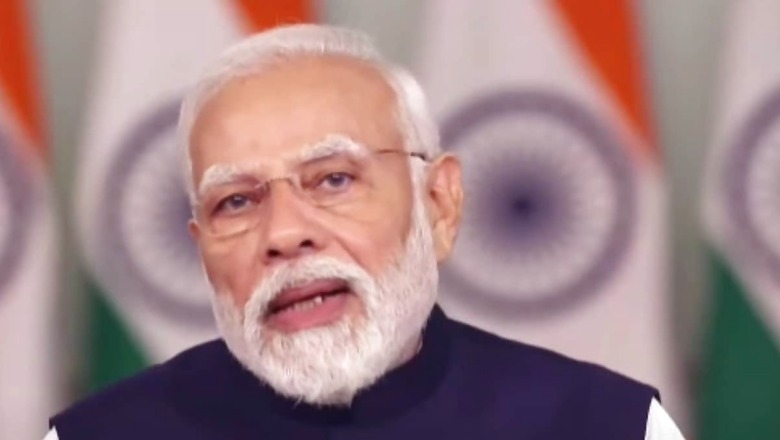
views
Prime Minister Narendra Modi will attend the UN climate talks in Dubai on November 1 and deliver a national statement highlighting India’s climate action, sources said on Friday.
The prime minister will reach the UAE on November 30, deliver India’s national statement during the United Nations’ World Climate Action Summit on December 1 and return the same day, a source told PTI.
The World Climate Action Summit on December 1-2 will see heads of states and governments, leaders from civil society, business, youth, indigenous peoples’ organizations, frontline communities, science and other sectors discussing actions and plans aimed at scaling climate action.
Modi has been championing Lifestyle for Environment (LiFE movement), urging countries to adopt planet-friendly living practices and move away from deeply consumerist behaviours. Recognising the criticality of this decade (2021-2030) for climate action, there’s a call for rebalancing consumption patterns between the Global North and South.
Differences in historic emissions and contributions to global warming across nations are evident. For instance, while the US accounts for only 4 per cent of the current global population, it contributed 17 per cent of global emissions between 1850 and 2021. In contrast, India, representing 18 per cent of the world’s population, has contributed only 5 percent of greenhouse gas emissions to date.
According to Oxfam International, a group of independent charitable organisations, the world’s wealthiest 10 per cent were responsible for around half of global emissions in 2015.
Modi had attended the Glasgow climate talks in 2021 and announced India’s strategy to combat climate change. In August last year, India updated nationally determined contributions or nation action plan to achieve the goals set in the 2015 Paris Agreement, especially the target of limiting global warming to well below 2 degrees Celsius and preferably to 1.5 degrees Celsius.
India’s updated NDCs aim to reduce emissions intensity of gross domestic product by 45 per cent by 2030 from 2005 levels and achieve 50 per cent cumulative electric power installed capacity from non-fossil fuel-based energy resources by 2030.
Union Environment Minister Bhupender Yadav will also participate in high-level events and roundtables of the 28th session of the annual climate talks (COP28), including on finance for climate goals, emissions reduction, adaptation to climate impacts, and transitioning to a green economy with inclusivity.
COP28, scheduled to take place from November 30 to December 12 in Dubai, UAE, will see the conclusion of the first-ever “global stocktake”, a periodic review of collective progress to meet the Paris Agreement goals. This assessment will shape forthcoming climate action plans or NDCs by 2025.
The climate conference may see hectic negotiations on how the fund meant to provide financial support to developing and poor countries for climate impacts should operate, and funding for adaptation.
The global south would demand the global north to undertake rapid decarbonization and massively scale up finance and technology support to limit global warming to 1.5 degrees Celsius.
Discontent among developing countries regarding unfulfilled promises of financial aid, particularly the yet-to-materialize USD 100 billion pledged by rich countries by 2020, is expected. Some countries, especially the European Union, are expected to push for a global deal to phase out unabated fossil fuels at COP28.
According to the Intergovernmental Panel on Climate Change, a body of top climate scientists in the world. Global emissions need to drop 43 per cent below 2019 levels by 2030 to avoid the worst impacts of climate change, caused largely by GHG emissions from the burning of fossil fuels.
In October, Sultan Al Jaber, the president-designate of COP28, urged nations to achieve a responsible phase-down of unabated fossil fuels and increase investments in clean energy. ‘Unabated’ refers to fossil fuels burned without employing controversial carbon emission capture technologies, allowing for continued burning if countries utilize technologies to reduce resulting emissions.



















Comments
0 comment